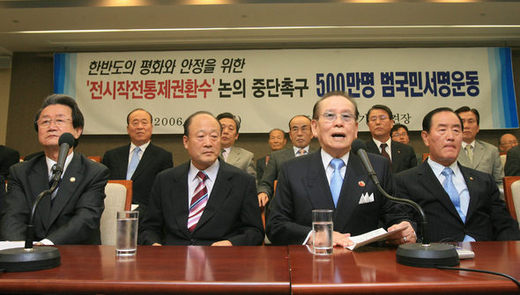 |
|
Consevative groups say at a press conference on September 12 that they would launch a campaign to get 5 million signatures to stop discussion on the transfer of wartime operational control,
|
Rep. Kim Hyon-mi of the ruling Uri Party, however, said, "The influence of the issue will not be strong, as [the GNP’s stance] solidifies an image of conservatism, signifying a return to the past. Instead, figures of the past emerge at the fore, strengthening the old-fashioned and obsolete image of the GNP." On contrary, Professor Kang Won-taek of Soongsil University said, "There were some unreasonable factors in the process, but it is difficult to place blame on conservative groups suggesting for bringing up political issues and clarifying their political inclinations." The GNP welcomes the movement of conservative groups, but on the other hand, it is concerned that its hardened image will have a negative effect on its efforts to expand ties with non-conservative forces. Overall, though, the main opposition party, however, looks delighted at the situation, because they think that public sentiment is moving toward their platform. When the wartime command transfer was raised, a majority of GNP members was opposed to it. Therefore, the GNP strived to prepare a countermeasure. Nevertheless, the GNP has not shown any intention to join hands with conservative forces. Rep. Hwang Woo-yea, secretary general of the GNP, said that "the party chairman will meet leaders of those groups at an appropriate time and members of the party frequently will hold rallies to oppose the wartime command transfer. But it is not proper for the party to come out to the fore." The GNP seems to worry that a direct alliance with conservative forces may solidify the party’s image as ultra-right. Koh Won, a senior researcher at Seoul National University’s Institute of Korean Political Studies, said, "It is the conservatives’ ’political strategy of hatred’ which inspires abhorrence for the Roh Moo-hyun administration and progressive-liberal forces. When the right-wing conservatives give rise to hatred, the GNP takes a little bit weaker position. In this way, [their roles complement one another]." His remark means that right-wing conservatives play the part of the "villain," while allowing the GNP to obtain political headway.






